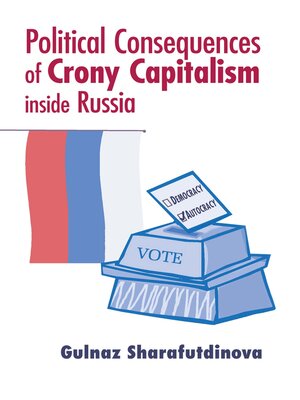Political Consequences of Crony Capitalism inside Russia
ebook ∣ Contemporary European Politics and Society
By Gulnaz Sharafutdinova

Sign up to save your library
With an OverDrive account, you can save your favorite libraries for at-a-glance information about availability. Find out more about OverDrive accounts.
Find this title in Libby, the library reading app by OverDrive.



Search for a digital library with this title
Title found at these libraries:
| Library Name | Distance |
|---|---|
| Loading... |
This book examines the coexistence of crony capitalism and traditionally democratic institutions such as political competition and elections in Russia after the collapse of communism. The combination, Gulnaz Sharafutdinova argues, has produced a distinct pattern of political evolution in contemporary Russia. Elections are meant to ensure government accountability and allow voters to elect a government responsive to their needs, but in postcommunist Russia the institutional forms of democracy did not result in the expected outcomes. Instead, democratic institutions in the context of crony capitalism—in which informal elite groups dominate policy making, and preferential treatment from the state, not market forces, is crucial to amassing and holding wealth—were widely devalued and discredited.
As Sharafutdinova demonstrates, especially through her close scrutiny of elections in two regions of Russia, Nizhnii Novgorod and the Republic of Tatarstan, crony capitalism made elections especially intense struggles among the elites. Massive amounts of money flowed into campaigns to promote candidates by discrediting their rivals, money purchased candidates and power, and elites thereby solidified their control. As a result, the majority of citizens perceived elections as the means for the elite to access power and wealth rather than as expressions of public will. Through her detailed case studies and her analyses of contemporary Russia in general, Sharafutdinova argues persuasively that the turn toward authoritarianism associated with Vladimir Putin and supported by a majority of Russian citizens was a negative political response to the interaction of electoral processes and crony capitalism.







